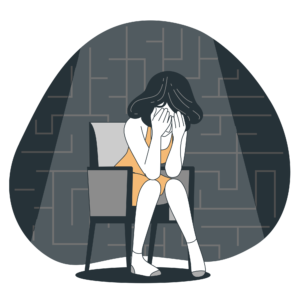SUICIDE AND SUICIDAL THOUGHTS
Did you know?
Commit suicide every year, one person every 40 seconds
Suicide is a major health problem and concern. The global suicide mortality rate amounts to 1.4%, making it the 18th leading cause of death in 2016, in fact, 79% of suicides occurred in low- and middle-income countries in 2016. A staggering amount of approximately 800.000 people die due to suicide every year, which is one person every 40 seconds.
The majority of suicides are closely related to psychiatric illness, with depression, substance abuse disorder and psychosis being the most relevant risk factors. However, anxiety, trauma-, personality-,eating-related disorders also contribute.
Suicidal thoughts are somewhat common, according to researchers, 1 in 6 people at some point in their life have thought about committing suicide. Over the past year, two to three in 100 have had suicidal thoughts. Usually, those thoughts are active only for a short while.
Whether you’re considering suicide or know someone who feels suicidal, identifying suicide warning signs and knowing where to seek for immediate help and professional treatment maybe save a life, your own or someone else’s.


What to do if you’re feeling suicidal?
If you’re feeling suicidal, but you aren’t immediately thinking of hurting yourself :
- Reach out to a close friend or loved one — even though it may be hard to talk about your feelings
- Contact a minister, spiritual leader or someone in your faith community
- Call a suicide hotline
- Make an appointment with your doctor, other health care provider or a mental health professional
For immediate help :
Call the national emergency number : 112
What are the signs?
Suicide warning signs or suicidal thoughts include:
- Talking about suicide or death — for example, making statements such as “I’m going to kill myself,” “I wish I were dead” or “I wish I hadn’t been born”, ‘’I just want to disappear’’
- Searching or acquiring the means to cause harm to your own life (guns, pills, razors, etc)
- Avoiding people, withdrawing from your loved ones
- Saying goodbye people as if you won’t see them again
- Giving away your personal belongings as if you won’t need them again
- Having mood swings, such as being emotionally high one day and deeply discouraged the next
- Being preoccupied with death, dying or violence
- Researching ways of dying
- Feeling trapped or hopeless about a situation
- Increasing use of alcohol or drugs
- Self-harm (such as cutting or burning yourself)
- Changing normal routine, including eating or sleeping patterns
- Constant anxiety and agitation
- Intense feelings of loneliness and emptiness










